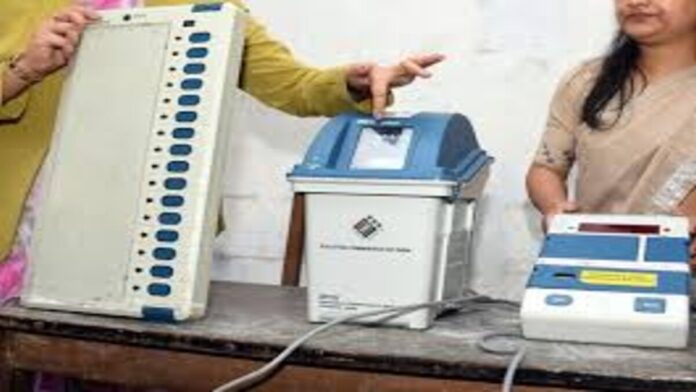Suspicion of EVM tampering was deemed “unfounded” by the Supreme Court, which on Friday rejected petitions for the 100% verification of voter verifiable paper audit trail (VVPAT) slips with the electronic voting machine count. This suggests that polling will take place according to schedule, with each voting machine linked to its corresponding VVPAT unit.
On the other hand, on the request of the second and third place contenders, it cleared the path for the verification of microcontrollers contained in EVMs and provided instructions for sealing and storing symbol loading units.
“In our considered opinion, EVMs are simple, secure, and user-friendly. The voters, candidates and their representatives, and the officials of the ECI (Election Commission of India) are aware of the nitty-gritty of the EVM system. They also check and ensure righteousness and integrity. Moreover, the incorporation of the VVPAT system fortifies the principle of vote verifiability, thereby enhancing the overall accountability of the electoral process,” said the Bench of Justices Sanjiv Khanna and Dipankar Datta.
The court decided that the current batch of writ petitions cannot be upheld based only on the allegation of a discrepancy in votes cast by electronic voting machines, which prompted a demand for a 100% VVPAT slip verification. “While maintaining a balanced perspective is crucial in evaluating systems or institutions, blindly distrusting any aspect of the system can breed unwarranted scepticism,” it said, adding that democracy is all about striving to build harmony and trust between all institutions.
The Bench said: “We must reject as foible and unsound the submission to return to the ballot paper system. The weakness of the ballot paper system is well known and documented.”
In accordance with the existing provisions, the count of the VVPAT slips from five randomly selected Assembly constituencies or segments would be verified with the EVM count.
One of the petitioners in this case, the Association for Democratic Reforms, had requested a 100% counting of VVPAT slips.
The court ordered that the symbol loading units (SLUs) in the VVPATs completed on or after May 1, 2024, be sealed and locked in a container, stating that this was done “to only further strengthen the integrity of the election process.” The seal must be signed by candidates or their representatives. The sealed containers shall be kept in the strong room along with EVMs for at least 45 days after the declaration of results. They shall be opened, examined and dealt with as in the case of EVMs.
Such candidates or their representatives shall identify EVMs by the polling station or serial number. All the candidates and their representatives shall have the option to remain present at the time of verification. Such a request should be made within seven days from the date of declaration of the result.
The district election officer, in consultation with the team of engineers, shall certify the authenticity/intactness of the burnt memory/microcontroller after the verification process is conducted. The actual cost or expenses for the said verification will be notified by the ECI, and the candidate making the request will pay for such expenses. The expenses will be refunded, in case the EVM is found to be tampered with.
During the course of hearing, it was suggested that instead of physically counting VVPAT slips, they could be counted by a counting machine. The court said that this suggestion, including the suggestion that barcoding of the symbols loaded in VVPATs may be helpful in machine counting, may be examined by the ECI. “These are technical aspects, which will require evaluation and study, and hence we would refrain from making any comment either way,” the Bench said.
The judgment said that blindly distrusting any aspect of the system can breed unwarranted scepticism and impede progress. “Instead, a critical yet constructive approach, guided by evidence and reason, should be followed to make room for meaningful improvements and to ensure the system’s credibility and effectiveness,” the court said.
Referred to as a “tight slap” to the Congress-led Opposition, Prime Minister Narendra Modi challenged it to “apologise” for the “sin” of sowing doubt about EVMs during a speech at an election rally in Bihar.
Congressman Pawan Khera, however, informed reporters that the Opposition would like to question Modi about whether BJP leader L K Advani was incorrect to publish a book that questioned the validity of EVMs and was written by BJP politician G V L Narasimha Rao.




